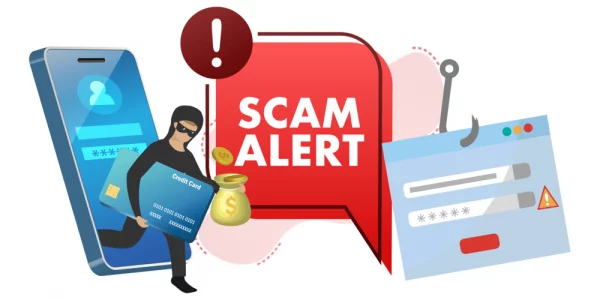Let’s face it – scammers are getting smarter every day in Nigeria, but you can be smarter! Whether you’re doing business, shopping online, or just using social media, knowing how to protect yourself is as important as having a good padlock on your front door. In this article, we’ll discuss some street-smart ways to avoid scams and fraud, and keep your money where it belongs – in your pocket!
Read more about Finance
If It Sounds Too Sweet, Taste It With Caution
You know that saying, “All that glitters is not gold”? This is your first line of defence to avoid scams and fraud. If someone is promising you heaven and earth – whether it’s a job that pays millions for doing nothing, or a business opportunity that will make you rich overnight – take a deep breath and think! Remember those “urgent 2k” messages that always come late at night? Yeah, that kind! If the offer sounds too good to be true, it probably is. Ask yourself: “Why me? Why are they being so generous? What’s the catch?”
Guard Your Bank Details Like Your Phone Password
Think about it – would you give a stranger the key to your house? Then why give out your bank details to just anyone? Scammers love asking for your ATM pin, CVV number, or OTP (One-Time Password). Remember this golden rule: no genuine bank will ever ask for your complete card details or password over the phone or by email. Not even if they say they’re calling from the bank’s head office! Treat your banking information like your underwear – don’t let just anybody see it.
Know Who You’re Dealing With
It’s crucial to verify who you’re dealing with before parting with your money. Shopping on Instagram or WhatsApp? Don’t just trust those fine product pictures! Check the seller’s profile thoroughly – how long have they been posting? What are other customers saying? Look for real reviews, not just emoji responses. For businesses, check their CAC registration. Think of it like buying food – you wouldn’t eat at a bukka without first checking if the environment is clean, right?
Keep Your Receipts and Document Everything
One smart way to avoid scams and fraud in Nigeria is to always keep records. Taking screenshots of online transactions, saving transfer receipts, and documenting conversations with sellers isn’t being paranoid – it’s being smart! Think of it like collecting evidence. If something goes wrong, these records will be your weapon. Remember how your mother always kept receipts from the market? Apply that same wisdom to your online transactions!
Use Secure Payment Methods Only
Listen, that story about sending money to a “brother’s account” because the main account has issues? Red flag! Stick to secure payment methods. Use your bank’s official mobile app, not some third-party app someone recommended. When shopping online, consider using escrow services or payment on delivery. It’s like using a trusted dispatch rider instead of giving your package to a random okada man on the street.
Sign up for the Connect Nigeria daily newsletter
-
Be Extra Careful with Investment Opportunities
These days, everyone in Nigeria claims to be an investment expert. “Put in 50k today, get 500k next week!” Sound familiar? To avoid scams and fraud in Nigeria’s investment space, do your homework. Check if the investment company is registered with SEC (Securities and Exchange Commission). Ask questions about their business model. If they get angry when you ask questions, run! Remember MMM? Yeah, let’s not go there again.
Trust Your Gut Feeling
You know that feeling in your belly when something doesn’t seem right? Listen to it! Scammers often try to rush you into making decisions. “This offer will expire in 30 minutes!” “Send money now or lose your account!” Take a step back when you feel pressured. To avoid scams and fraud in Nigeria, sometimes the best defence is simply to slow down and think things through. It’s like when your mother says, “Remember whose child you are!”
Use Strong Passwords and Security Settings
Make your passwords stronger than your village people’s determination! Use different passwords for different accounts. Add numbers, symbols, and capital letters. Enable two-factor authentication on all your important accounts. Think of it like adding extra locks to your door – the more security layers, you have, the harder it is for scammers to get in.
Be Wary of Emotional Manipulation
Scammers love to play with emotions. To avoid scams and fraud in Nigeria, watch out for people who try to pressure you using sympathy or fear. Whether it’s a sick relative needing urgent money, or a threat about your bank account being blocked – take a moment to verify independently. Call your bank’s official number (not the number they give you), or check with other family members first.
Stay Informed About New Scam Techniques
Scammers are like some politicians during election season – always coming up with new tactics! Keep yourself updated about the latest scam techniques. Follow your bank’s official social media accounts for security updates. Join reliable online communities where people share experiences about scams. Knowledge is power, and in this case, it’s also protection!
Register to attend the CN Business Mixer
Final Thoughts
Avoiding scams and fraud in Nigeria isn’t about being paranoid – it’s about being smart and alert. Take these tips seriously, share them with your loved ones, and let’s make life harder for these scammers!
Featured Image Source: MoneyMagpie
Got a suggestion? Contact us: [email protected]


